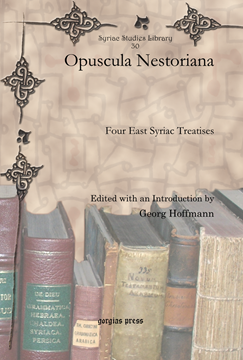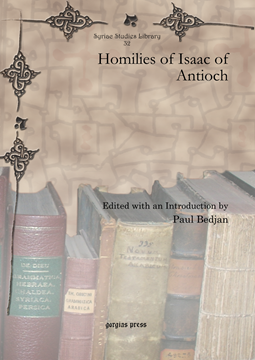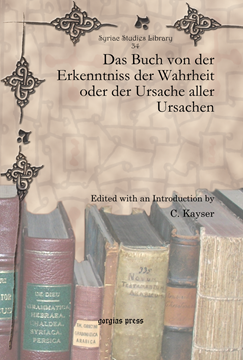Ravenna als Vorort aramäischer Kunst
Series: Analecta Gorgiana 444
ISBN: 978-1-60724-852-1
Previous attempts to compare the art and architecture of Ravenna have focused only on Rome and Constantinople, but Josef Strzygowski argues here that the Oriental Christian tradition should be considered as a contributing influence as well.
$37.00 (USD)
Die Götterliste des Mar Jakob von Sarug in seiner Homilie über den Fall der Götzenbilder
Series: Analecta Gorgiana 445
ISBN: 978-1-60724-853-8
In the early twentieth-century, P.S. Landersdorfer published a translation of Jacob of Serug’s homily on the fall of the idols accompanied by a commentary. Bernhard Vandenhoff publishes here a critique of Landersdorfer’s conclusions about the gods mentioned in Jacob’s “god-list.”
$37.00 (USD)
Untersuchungen zur Chronik des Pseudo-Dionysios von Tell-Mahrê
By Felix Haase
Series: Analecta Gorgiana 446
ISBN: 978-1-60724-854-5
Felix Haase presents one of the first in-depth surveys of the text of the Chronicle of Pseudo-Dionysius of Tell-Mahre and focuses on the issue of the texts that were used as sources for the composition of the Chronicle
$43.00 (USD)
Die Kirchenmusik im byzantinischen Reiche und Zur Entzifferung der byzantinischen Notenschrift
By Egon Wellesz
Series: Analecta Gorgiana 447
ISBN: 978-1-60724-855-2
Egon Wellesz presents here an in-depth survey of Christian music in the Byzantine tradition. Wellesz discusses the present state of research and the problems inherent in such a survey, and describes the notation and symbols used in the manuscript tradition.
$44.00 (USD)
La grande grammaire de Grégoire Barhebraeus
Texte syriaque édité d'après les manuscrits avec une introduction et des notes
Edited with an Introduction by Axel Moberg
Series: Syriac Studies Library 28
ISBN: 978-1-60724-862-0
Moberg had already published a German translation of Barhebraeus’s longer Syriac grammar based on a critically established Syriac text and here presents that text in this volume, along with an introduction (in French) and two indices (Syriac and French).
$178.00 (USD)
Opuscula Nestoriana
Four East Syriac Treatises
Edited with an Introduction by Georg Hoffmann
Series: Syriac Studies Library 30
ISBN: 978-1-60724-866-8
This volume contains four East Syriac treatises: two dealing with words forms and lexicography, two dealing with the interpretation of difficult words in the Bible. The book will be of interest to students of Syriac grammar and biblical interpretation.
$134.00 (USD)
Homilies of Isaac of Antioch
Edited with an Introduction by Paul Bedjan
Series: Syriac Studies Library 32
ISBN: 978-1-60724-870-5
Under the name of Isaac of Antioch, also known as the Great, or the Teacher, more than 200 memre exist. Here Bedjan produces the (vocalized) Syriac text of 67 memre, 43 edited for the first time.
$299.00 (USD)
Das Buch von der Erkenntniss der Wahrheit oder der Ursache aller Ursachen
Edited with an Introduction by C. Kayser
Series: Syriac Studies Library 34
ISBN: 978-1-60724-876-7
This volume contains a unique theological-philosophical text in Syriac known as the Book on the Knowledge of the Truth, or the Cause of Causes. The author describes it as “a common book for all peoples under heaven.”
$156.00 (USD)
Syrische Grammatik des Mar Elias von Tirhan
Edited and Translated by Friedrich Baethgen
Series: Syriac Studies Library 35
ISBN: 978-1-60724-877-4
Baethgen produces here both the Syriac text and a German translation with notes, including remarks on Elias’s grammar in connection with Greek and Arabic grammatical traditions; the Syriac text includes textual notes.
$120.00 (USD)
John of Mosul's Book of Beautiful Guidance
Edited with an Introduction by Elias Ioannes Millos
Series: Syriac Studies Library 36
ISBN: 978-1-60724-878-1
John of Mosul’s (died 1270) poem of spiritual guidance in the seven-syllable meter deals with, among other things, learning and the reading of Scripture, fasting, prayer, the Lord’s Prayer, parents instructing their children in doctrine, astrology and magic, etc.
$156.00 (USD)









